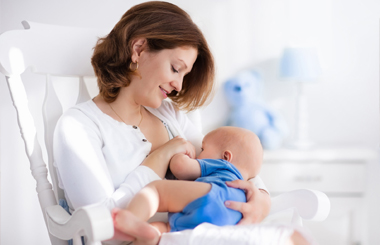 One of the most effective ways to ensure child health and survival is through breastfeeding. August is observed as National Breastfeeding Month and August 1-7 as World Breastfeeding Week (WBW). The World Health Organization (WHO) states that World Breastfeeding Week is celebrated to promote, protect and support breastfeeding. To build a landscape of breast feeding support, the United States Breastfeeding Committee has announced the theme of National Breastfeeding Month 2019 as “Support Changes Everything”.
One of the most effective ways to ensure child health and survival is through breastfeeding. August is observed as National Breastfeeding Month and August 1-7 as World Breastfeeding Week (WBW). The World Health Organization (WHO) states that World Breastfeeding Week is celebrated to promote, protect and support breastfeeding. To build a landscape of breast feeding support, the United States Breastfeeding Committee has announced the theme of National Breastfeeding Month 2019 as “Support Changes Everything”.
According to WHO, If all children of 0-23 months were optimally breastfed, then over 820 000 children’s lives could be saved every year among children under 5 years. However, as of latest global statistics, only 40% of infants under six months of age are exclusively breastfed. As the world observes Breast Feeding Week this year, WHO, UNICEF and partners are working to promote the importance of family-friendly policies to enable breastfeeding and help parents nurture and bond with their children in early life, when it matters most. This includes
- Enacting paid maternity leave for a minimum of 18 weeks
- Paid paternity leave to encourage shared responsibility of caring for their children on an equal basis
- Mothers need access to a parent friendly workplace.
A parent friendly workplace is the place that helps new moms to protect and support their ability to continue breastfeeding upon return to work by having access to breastfeeding breaks; a safe, private, and hygienic space for expressing and storing breast milk; and affordable childcare.
Breastfeeding is definitely the best nutrition a mother can give to her baby. WHO and the American Academy of Pediatrics (AAP) recommend that babies should be exclusively breastfed starting within one hour after birth and until the baby is 6 months old. Nutritious complementary foods should be provided along with breast milk for up to 2 years or beyond.
The Centers for Disease Control and Prevention (CDC) states that breast milk is a nutritionally balanced meal that provides essential nutrients as well as antibodies to protect newborns against infectious disease. Breastfeeding can also help protect mother and baby against some short- and long-term illnesses and diseases. Breastfed babies have a lower risk of:
- Asthma
- Diabetes (type 2)
- Eczema (a skin disease)
- Gastrointestinal infections (diarrhea/vomiting)
- Ear Infections and respiratory Infections
- Inflammatory bowel disease
- Necrotizing enterocolitis (NEC) for preterm infants
- Obesity
- Sudden Infant Death Syndrome (SIDS)
Some studies also indicate that breastfed babies have higher intelligence scores and are less likely to develop problems with behavior and learning as they grow older compared to formula fed babies.
Breastfeeding also offers many benefits for mothers, such as having a lower risk of
- Breast and ovarian cancers
- Diabetes (type 2)
- Hypertension (high blood pressure)
The scientific-based benefits of breastfeeding for mothers are as follows:
- Weight loss: According to Healthline, mothers who breastfeed tend to lose weight after the first 3 months of delivery. Your body stores fat during your pregnancy to provide the extra calories needed for milk production, and while feeding, these fats are burned, resulting in weight loss. Beginning around 3-6 months after delivery, mothers who breastfeed have been shown to lose more weight than mothers who don’t breastfeed.
- Helps with uterus contractions. Breastfeeding encourages postpartum uterine contractions, which can minimize bleeding and help your uterus shrink back to its pre-pregnancy size.
- Promotes mother-baby bonding: Research also shows that breastfeeding may have physical and emotional benefits for both mother and baby. It is said that while the baby is snuggled close to the mother’s breast, it can quickly recognize the mother’s heartbeat, which invokes a feeling of calmness and protection in the baby. Oxytocin, the ‘love hormone’ that helps nurture emotional bonding, is also higher in breastfeeding moms.
Join the campaign – Pledge your support for women to breastfeed anytime, anywhere.